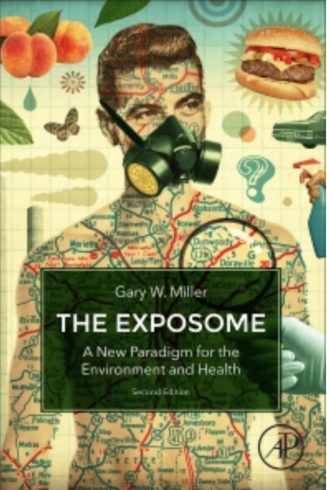
To learn more see below:
https://www.elsevier.com/books/the-exposome/miller/978-0-12-814079-6

Eric Topol comments on exposome article in Science.
Save
Save
Save
Featured News 
Latest Tweet 
- The U.S. version of the #exposome wikipedia site has returned after a multi-year absence. https://t.co/TsZSr75bU3
Exposome-Related News 
- Probing the digital exposome: associations of social media use patterns with youth mental health | NPP—Digital ... - Nature.com
- Heavy Metals and Trajectories of Anti-Müllerian Hormone During the Menopausal Transition
- Personal Care Product Use During Puberty and Incident Breast Cancer Among Black, Hispanic/Latina, and White Women in a Prospective US-Wide Cohort
- Association of the external environmental exposome and obesity: A comprehensive nationwide study in 2019 among ... - ScienceDirect.com
- Interlaboratory Study on Zebrafish in Toxicology: Systematic Evaluation of the Application of Zebrafish in Toxicology's (SEAZIT's) Evaluation of Developmental Toxicity
- Differential DNA Methylation in the Brain as Potential Mediator of the Association Between Traffic-related PM2.5 and Neuropathology Markers of Alzheimer's Disease
- Association of the external environmental exposome and obesity: A comprehensive nationwide study in 2019 among ... - ScienceDirect.com
- This Common Household Habit Could Be Increasing Your Risk of ALS - SciTechDaily
- An Attached Garage May Increase ALS Risks - Healthnews.com
- Why your garage could be putting you at risk of developing ALS - Study Finds
- Paints and Pesticides Linked to ALS Risk - Neuroscience News
- New Exposomics Center: On the Cutting Edge of an Emerging Field - Columbia University's Mailman School of Public Health
-

Definition
The human exposome is the environmental equivalent of the human genome. It is a representation of the complex exposures we are subjected to throughout our lives, including our diet, lifestyle factors, and social influences. It also incorporates how our bodies respond to these challenges. The exposome encompasses much of what we refer to as nurture. The term exposome was coined by Dr. Christopher Wild at the International Agency for Research on Cancer, World Health Organization.
-

Vision
Several academic and government laboratories across the world are collecting data that can contribute to our understanding of the exposome. Our goal is to bring these investigators together to formulate a plan to define the exposome in a way that is useful to those in health care and public health, to identify gaps in knowledge or technique, and to help develop a new generation of scientists who focus on these complex environmental influences on health. The Human Exposome Project will build upon the already existing resources and work to identify additional funding to pursue the important questions in the field.
-

Need
The rapid advancement in the areas of genetics and genomics has transformed our understanding of human biology. However, genome-wide association studies (GWAS) have only been able to account for a minority of disease risk. Quantitative data on the environmental factors that influence health are desperately needed. The Human Exposome Project can help provide this important information in a form that can be used to directly impact human health.
